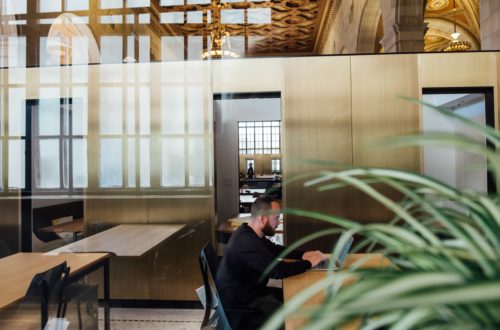There are so many things to worry about when creating a startup, from the specifics of the business plan to the hiring of key staff. Making your office environmentally friendly might seem like a luxury, but give it some thought and don’t push it to the background. Startups can make a big difference in minimizing the impact on the environment.
Five eco-friendly ideas startups can use to help the environment.
1. Allow Employees to Work from Home
There’s a delicate balance in having people work from home and in the office, as some people work better in the home environment than in a more structured office setting. The good news is that studies show that working from home not only increases productivity, but also is good for the environment.
The Consumer Electronics Association found that working from home saves on average 1.4 gallons of gas a day, while also cutting electricity usage by 16 kilowatt hours per day. Now imagine these numbers on a larger scale. If everyone in the U.S. worked from home for a day, it’d be the equivalent of taking 77,000 cars off the road for a year.
2. Go Paperless When Possible
With the advent of all things digital in the past couple decades, many companies seem to be heading in the direction of going paperless –- or at least paper-light – in their offices. However, there’s still much room for improvement, as 39 percent of all copies are tossed in the trash, according to Entrepreneur magazine. What’s worse is that the average office worker prints 10,000 pages a year.
New startups should encourage employees to avoid waste and, at the very least, recycle unused pages. Sometimes it’s as simple as reminding people to print double-sized.
The benefits of reducing paper go beyond the environment and can make a big difference on the bottom line. Entrepreneur warns that a four-drawer filing cabinet costs about $25,000 to fill up, and takes up valuable space in the office that could be used for something much more important.
3. Consider Your Office Space
If the start-up has outgrown your home or the nearest coffee shop, it’s time to get a bigger space. Traditional offices in a large building might be environmentally friendly if built up to modern standards, but many buildings might be inefficient and outdated.
Depending on the startup, a viable alternative might be modular buildings. Modular office designs can be built to Leadership in Energy and Environmental Design (LEED) standards and can be constructed from recyclable materials. See some more benefits of modular buildings on the JLL Spaces blog.
4. Green the Office
Filling the office with plants is a simple yet often overlooked way to improve indoor air quality and brighten the mood of the people working there. The connection between indoor plants and clean air was first studied by NASA way back in 1989, and it’s recommended to have at least one plant for every 100 square feet of office space.
More recently, a studied published in the Journal of Experimental Psychology found that filling a bare office space with plants increases productivity by 15 percent. Few things are as inexpensive yet beneficial as some simple indoor plants. Just don’t forget to give the plants some water.
5. Don’t Use Disposables
In the U.S. alone, 25 billion Styrofoam cups are thrown out each year according to Carry Your Cup. The advocacy group reports that buying a daily coffee or tea in a disposable cup creates 23 pounds of waste in one year.
The solution is simple and even some of the largest companies are getting on board. Get rid of those small water cups and provide reusable water bottles. Instead of Styrofoam cups, provide mugs. Do the same in getting rid of paper plates.
Keep Mother Nature in mind when it’s time to expand your startup from beyond your living room couch and into the next stage.
Image by Alejandro Escamilla
Kayla Matthews is a healthy living blogger with a passion for eco-friendly lifestyles. You can follow her on Twitter to read her latest posts.






